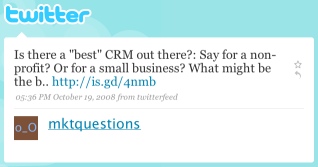
It's interesting to see this question wrapped up in the distinction between small businesses and not-for-profit. That leads me to think this questioner is really after one thing: CHEAP.
What's great about today's batch of CRM applications? They actually are affordable for most types of organizations, even small businesses and not-for profits that don't have a lot of money. Having worked in the not-for-profit world as both a fundraiser and as a consultant, I have run across two types of folks who would be likely to set up their offices on CRM applications.
The first group believes strongly in Mission Based Marketing, and understands how to leverage their investments to bring in more donations. They're not afraid to spend $25,000 on a high-end CRM application if it means that they'll get a $250,000 return on that outlay. Like major corporations, they rely on solid marketing tactics, especially direct mail and online appeals. However, it's becoming harder to justify large overhead expenses to major donors. Nobody wants to see their big donation cover the cost of a very un-sexy software tool, even if that tool is pulling back nine or ten times its price tag in revenue.
The second group are the bootstrappers. These harried office organizers might not even be getting a paycheck for doing something they love to do. But they want to leverage software to help their causes. "Free" and "cheap" might be appealing to them -- it's easy to suck up a $12/month seat license on one's own dime. But lower cost CRM applications might not always have the right mix of features and support for charities.
Here are some of the low-cost CRM applications that are making great inroads into the non-profit sector:
GivenGain: Via the always-helpful eHub, I just learned about this new entrant in the race for "best CRM application designed for non-profits." This European team offers a donor management solution with two tiers: a fully-featured solution that includes e-mail outreach for $60 per month and a lite version with basic tools for $10 per month. Integrated payment processing is available for 3% plus transaction fees. Those fees are a little higher than PayPal's, but with all of the hassles of getting a non-profit set up with a merchant account, this structure is great for non-profits that are just getting started with online giving.
Zoho CRM: This little upstart has made a name for itself by cloning some of users' favorite elements from Google Docs and Salesforce, and blending them into its own CRM suite. Zoho lets teams of up to three users work the CRM application for free, making it ideal for budget-minded organizations. While Zoho offers web forms and other tools to import donor information, users must bring their own payment processing. This is good for groups with an existing web presence or a donor pool that loves writing checks.

Convio: The suite of tools offered by this specialist CRM software company might not appeal to folks looking for cheap solutions. However, Convio was one of the first programming companies that specifically addresses the needs of non-profits. They specialize in event-based donor management solutions, especially team fundraising activities. Best of all, they're not afraid to look outside themselves for inspiration -- some of their latest tools are actually built on the Salesforce.com application platform, bringing the best of both worlds to non-profits.

No comments:
Post a Comment